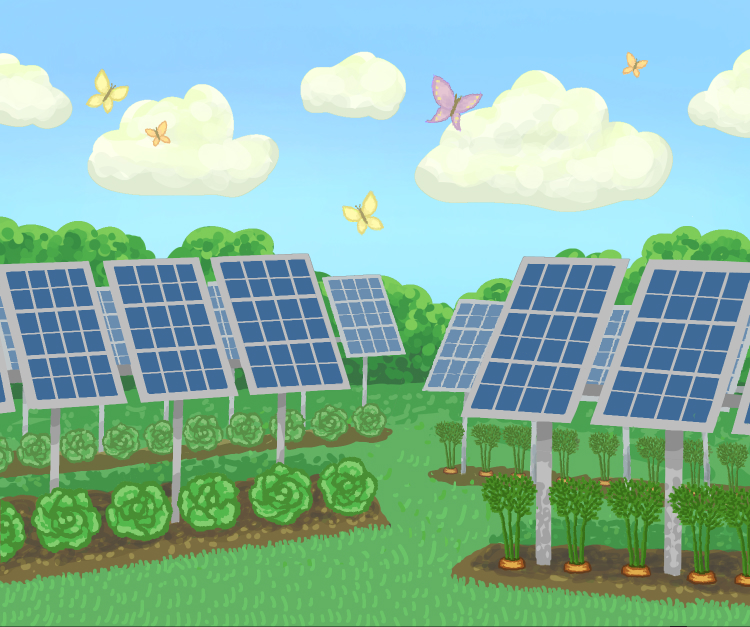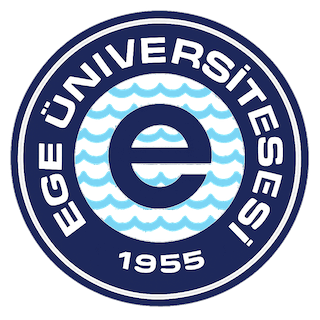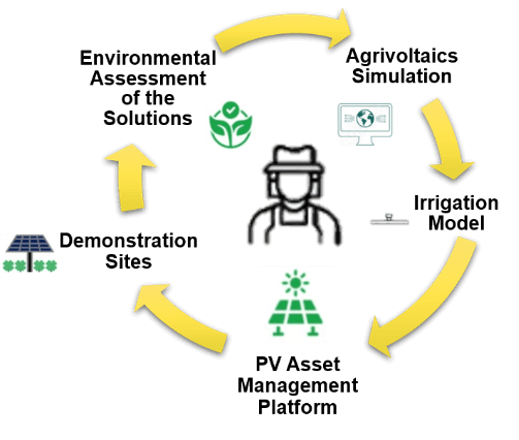DIGI-GROW — combining solar energy production and agriculture on the same land using agrivoltaic systems

DIGI-GROW is developing an accessible and intelligent science-based digital platform to support the management of agrivoltaic (APV) systems. Our target stakeholders are primary farmers, and as secondary stakeholders any advisors, policymakers, researchers in the food industry or the industry in general.
Key features and capabilities will include
- Friendly user interface tailored for non-technical users
- Usable for both planning new and managing existing APV installations
- Connected to historical and project datasets and real-time sensor data
- Tools for water and energy efficiency tracking
- Crop yield prediction models
- LCA (Life Cycle Assessment) tailored for APV
- Reduced operation and maintenance (O&M) costs, improved revenue
- Scalable across multiple countries and climates
Simulation & modelling components
- Spatio-temporal irradiance model
- Dual PV-Crop productivity model
- Techno-economic APV model (incl. yield & revenue estimates)
- Irrigation model adapted to APV
- Energy and irrigation management tools
- Integrated weather forecast data
Launch timeline
- Sizing Tool: November 2026
- Full Platform: July 2027

Main objectives
Improve land-use efficiency
Increase farm profitability
Optimise energy and water use
Deliver data-driven management tools for APV systems
Work packages
What are work packages
Work packages are different phases of the project. Click on a package to read more.
WP1
Project coordination
WP2
Simulation Modelling (PV, crop, economic)
WP3
Irrigation Modelling
WP4
Platform Development
WP5
Demonstration Sites
WP6
Environmental Assessment (LCA)
WP7
Dissemination and Exploitation
Consortium

DLR Institute of Solar Research
Coordinator, Germany
The DLR Institute of Solar Research is one of the world’s leading institutions in the field of solar energy. With around 120 researchers across five locations, it focuses on advancing solar technologies as well as measuring and modeling solar fields. With a strong background in simulation modelling and system monitoring, DLR develops dual-use APV models and coordinates the overall project implementation. Their expertise ensures high technical quality in energy yield predictions, crop modelling, and project management across the consortium.
Contact person
Dr. Álvaro Fernández Solas
alvaro.fernandezsolas@dlr.de
https://orcid.org/0000-0003-4650-9470 Linder Höhe, 1, 51147 Cologne, Germany

Bettergy SL R&D
Spain
Bettergy is an energy-tech company with extensive experience in digital platform development and energy analytics. In DIGI-GROW, Bettergy leads the creation of the software platform, integrating simulation tools, real-time monitoring, and decision-support systems tailored to APV systems. They bring strong capabilities in user-focused web design, data integration, and stakeholder engagement in Spain and beyond.
Contact person
Mr Jesús Huete
Juan López Peñalver, 17, 29590 Málaga, Spain
bettergy.es
Avoin ry
Finland
Avoin ry is a non-profit digital innovation organisation experienced in open-source software, sustainable agriculture, and stakeholder co-creation. In DIGI-GROW, Avoin develops the user interface, pre-sizing tool, and Finnish localisation of the platform, while also coordinating outreach and pilot testing with local farms. Their design and data expertise ensure the platform is inclusive, scalable, and grounded in real-world needs.
Contact person
Mr Otso Valta
avoin.org

Ege University Solar Energy Institute
Türkiye
Ege University contributes deep academic expertise in solar energy integration and sustainable irrigation. They lead the development of irrigation models, build a 400 m² APV demo site, and conduct comprehensive Life Cycle Assessments for the project. Their work bridges solar technologies and agricultural management, ensuring tools are scientifically robust and environmentally sound.
Contact person
Dr Neslihan Çolak Güneş
neslihan.colak@ege.edu.tr
Gençlik Caddesi, 12, 35040 Bornova, Türkiye
Contact us
Have a question or want to collaborate? We welcome thoughts and ideas from farmers, industry experts, policymakers, and the scientific community.
All messages are read and considered as input for the project. We’ll reply when we have something useful to share or discuss.
Work package 1: Project Coordination
DLR leads the overall management of the DIGI-GROW project, ensuring smooth collaboration between all partners. This work package oversees project governance, internal communication, quality control, and reporting to the EU. It also includes the Data Management Plan and Risk Mitigation Strategy to ensure project integrity throughout its lifecycle.

Work package 2: Simulation Modelling
This work package develops advanced models to simulate light, crop yield, energy production, and system profitability in APV systems. The modelling integrates environmental, technical, and economic data to provide predictive insights for optimal APV operation. Led by DLR, with support from Ege University and Bettergy, this work lays the scientific foundation for all decision-support features in the DIGI-GROW platform.

Work package 3: Irrigation Modelling
Led by Ege University, this package customises evapotranspiration and irrigation models specifically for agrivoltaic conditions. It considers shade, microclimate, soil properties, and crop type to optimise water use under solar panels. A simulation-based irrigation tool will improve efficiency and reduce overwatering in diverse farming environments.

Work package 4: Platform Development
Bettergy and Avoin are building the DIGI-GROW digital platform, combining simulation models with sensor data and user-friendly interfaces. The platform includes tools for energy and irrigation management, yield prediction, and operational alerts. It is designed to be scalable, secure, and accessible to farmers and other non-technical users across Europe.

Work package 5: Demonstration Sites
Demonstration systems in Spain and Türkiye will test the digital tools and collect real-world data. DLR and Ege University will install sensors and monitor system performance, crop growth, and water use. These living labs will validate models and ensure the platform works effectively in practical settings.

Work package 6: Environmental Assessment (LCA)
Ege University leads the development of a Life Cycle Assessment (LCA) model tailored for APV systems. The LCA will measure environmental impacts such as carbon and water footprints before and after platform implementation. Findings will support evidence-based recommendations for sustainable APV adoption.

Work package 7: Dissemination and Exploitation
This package focuses on communication, stakeholder engagement, and long-term use of DIGI-GROW outcomes. It includes outreach through websites, publications, and demo events, as well as collaboration with farmer networks. DLR leads this work, supported by others, ensuring that the platform reaches its audience and remains accessible, relevant, and impactful beyond the project’s lifetime.

